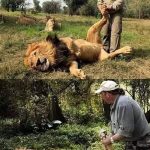Led by Love: How a Boy and a Blind Deer Taught a Town the Meaning of Humanity

Led by Love: How a Boy and a Blind Deer Taught a Town the Meaning of Humanity
Every morning, before the sun had fully stretched its arms across the sleepy rooftops and the dew had dried from the grass, a quiet ritual unfolded in a small town where nothing much ever seemed to change. A ten-year-old boy, small for his age but steady in step, would emerge from his home with purpose in his stride and gentleness in his hands. He spoke to no one. He didn’t carry a phone or wear shoes that blinked with light. He carried no leash, no rope, no food. Only love. From the shadows of a nearby grove, a blind deer would appear—tentative, slow, trusting—and without a word, the boy would gently place his hand on the deer’s neck, offering guidance. Together, in silence, they would walk toward a patch of open field where the freshest grass grew thick and sweet with the morning sun. The boy would wait, standing a few feet back, watching as the deer grazed safely, unafraid, nourished by both the land and the kindness that brought it there.

There were no cameras to capture the moment. No interviews. No applause. No social media posts to count the likes. It was a moment that lived quietly and sincerely, repeating day after day like a soft hymn beneath the noise of the world. But people began to notice. A neighbor watering her plants early one morning saw the pair pass by, the boy’s hand barely touching the deer’s shoulder, just enough for the animal to feel its way forward. She told someone. He told another. Soon, the whole neighborhood knew—but they didn’t interrupt. They watched in reverence, never speaking a word, afraid that if they did, the spell might break.
They watched a child, barely tall enough to ride a bike without training wheels, guide a creature of the wild with more empathy and grace than many adults ever muster. He never told anyone why he did it. He didn’t wear a shirt proclaiming “Animal Hero.” He didn’t ask for money or attention. He didn’t even speak to the deer—he simply showed up every morning, without fail, and gave his time, his patience, and his trust. Some days it was cold. Other days it rained. But he came anyway.

The deer, for its part, seemed to understand. It moved only when he was near. When others tried to approach, it would hesitate, uncertain, as though the rest of the world were made of fog and danger. But with the boy, it walked freely, instinctively aware that this small human with soft footsteps and a gentle soul meant safety.
And so they became part of the town’s rhythm. While the school bus rolled by and doors opened with yawns and coffee mugs, a boy and a blind deer quietly crossed the back road to the field beyond. It was such a simple thing, so quiet, so small—but in its smallness was a kind of beauty that no grand gesture could match. The kind of beauty that lives in unnoticed moments. The kind that reminds us that humanity, in its purest form, is about presence—not performance.

As word spread, the temptation grew to share the story—to put it on the news, to take photos, to tell the world what was happening in their tiny corner of it. But the town resisted. Because they understood. This wasn’t about viral fame or feel-good features. It wasn’t about making the boy into something he wasn’t. It was about preserving the sacredness of what was unfolding—the fragile, unspoken bond between child and creature, and the quiet love that held them together.
There are many things we expect from ten-year-olds: spilled cereal, scraped knees, unfinished homework. We expect energy, mischief, play. We don’t expect them to teach us what it means to care without needing anything in return. We don’t expect them to model selflessness—not because they can’t, but because too often, the world teaches them to look inward before they learn to reach outward. And yet, here was this boy, asking for nothing, yet giving everything. Every morning, he made a decision not just to help, but to stay committed. Not just to show up once, but to show up always. That’s not just kindness. That’s devotion.

And the deer—helpless in its blindness, vulnerable to predators, disoriented by the loudness of the world—was not rescued by a sanctuary or a wildlife team, but by the smallest hands imaginable. Hands that didn’t try to change the animal. Didn’t try to fix what was broken. Just tried to walk beside it, one step at a time.
The people in the town began to change too. Something about witnessing that quiet ritual softened them. They started holding doors open longer. They smiled more. Complained less. One man who had once chased stray animals from his yard began leaving out bowls of water. Another neighbor who never spoke much began saying good morning to strangers. They didn’t even realize they were changing at first. But they were. Because witnessing real compassion—especially the kind that expects nothing in return—has a way of reaching into people’s hearts and reminding them of the good they still carry.

Some began to wonder what would happen when the deer no longer needed help, or when the boy grew older. Would the ritual end? Would the deer forget? Would the world, as it always does, move on?
Maybe it would. Maybe it already has. But that’s not the point.
Because the story—the real story—isn’t about how long the boy helped the deer, or whether someone built a statue in their honor, or whether a news crew came to film the moment. The story is about a child who saw suffering and decided to meet it with tenderness. A child who didn’t need a reason to be kind. A child who reminded an entire community that the purest love is often the quietest.
Sometimes we look for heroes in capes or uniforms. Sometimes we wait for someone to fix the big things—to pass the laws, to start the movement, to lead the charge. But often, the deepest healing comes from smaller places—from a hand gently resting on the neck of a frightened creature. From the sound of soft footsteps in the morning dew. From the smallest hands carrying the biggest hearts.

That boy may never know the impact he made. He may never understand how deeply he moved the people who watched him. And he may not need to. Because he didn’t do it for the story. He did it because he could. Because the deer needed someone. And he chose to be that someone.
In a world often overwhelmed by noise—by shouting, division, spectacle—his silence spoke volumes. It reminded us that love doesn’t always announce itself. Sometimes, it just shows up. Every morning. Without a word. And does what needs to be done.
Let this story stay with you. Let it root itself in the part of you that still believes in quiet goodness. Let it remind you that you don’t need to be famous, or wealthy, or grown-up to change the world. You just need to care. And act. Even if no one’s watching.

Because the truth is, someone is always watching. A neighbor. A child. A stranger passing by. And sometimes, the gentlest acts ripple further than the grandest declarations.
So may we all learn from the boy and the deer. May we meet the vulnerable with patience. May we guide others with gentleness. May we show up, even when it’s inconvenient. And may we never underestimate the power of doing a small thing with great love.
After all, sometimes, the smallest hands carry the biggest hearts—and their quiet kindness is what keeps the world turning.










